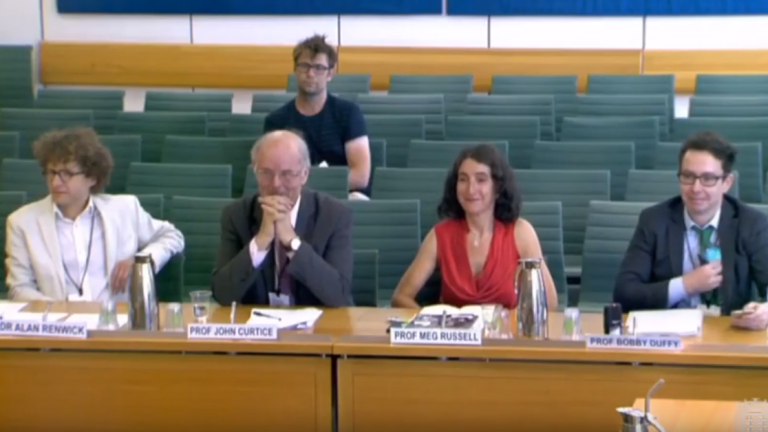Prof Meg Russell and Dr Alan Renwick give evidence to the Exiting the European Union Committee
1 August 2019

On 24 July 2019 Constitution Unit Director Professor Meg Russell and Deputy Director Dr Alan Renwick gave evidence to the House of Commons Exiting the European Union Committee. As part of the Committee’s ongoing inquiry into the progress of the UK’s negotiations on EU withdrawal, they collectively contributed to two panels: the first examining the potential role of citizens’ assemblies in identifying a way forward in the Brexit process (where Alan appeared alongside Sarah Allan, Head of Engagement for Involve, and Professor David Farrell of University College Dublin, expert on citizens’ assemblies in Ireland), and the second considering the issue of a further referendum (where Meg and Alan appeared alongside Professor John Curtice of Strathclyde University and Professor Bobby Duffy, Director of the Policy Institute at King’s College London).
On the first panel on the role of citizens’ assemblies, Alan Renwick noted that:
- Citizens’ assemblies are particularly suited to dealing with contentious issues on which there is wide acceptance that something needs to be done, but where agreeing a particular course of action has proved difficult.
- Citizens’ assemblies may be useful if there is a need to demonstrate public support for measures which are in everyone’s long term interests, but which are difficult to address in the short term – such as social care.
- In relation to Brexit, a citizens’ assembly should ideally have been held prior to the 2016 referendum in order to discuss the UK’s relationship with the EU and consider what leaving the EU would mean. Had it recommended a referendum, and the referendum returned a Leave vote, a further assembly could have been involved in thinking about the next steps.
- Citizens’ assemblies should not be seen as unduly expert-driven. The witnesses who speak to an assembly may include not just conventional ‘experts’, but also people with direct experience: at the Irish Citizens’ Assembly on abortion, for example, some spoke very personally about how the existing rules had affected them. And learning within a citizens’ assembly happens between assembly members as well as in interactions with witnesses.
- Given the political and media culture of the UK and the contentious nature of Brexit, confidentiality would be a key consideration for a citizens’ assembly on that topic. It would be worth considering extending the protections given to jurors to members of such an assembly to ensure participants were not subject to Twitter trolling or tabloid interference.
- Alan Renwick argued that a second referendum would need to be run on the same broad process as in 2016 to avoid the perception that the other side had won as a result of changing the rules. However, where rules are no longer working, some changes could be made. Notably, rules on digital campaigning should be updated to ensure greater transparency. Further areas needing reform include rules on joint campaigning and on the role of government.
- On the potential arrangements for a further Brexit referendum, and whether ‘no deal’ should be an option on the ballot, Meg Russell noted that many would argue this excluded a legitimate option. However there are also strong arguments on the other side, in three areas:
- First, the question of clarity, as highlighted by the Independent Commission on Referendums, demands that the proposals put to a referendum are clear and that voters know what would happen in the event of a vote for change.
- Second, parliamentarians must consider the question of viability; options must only be put on a ballot paper if legislators are comfortable with such options being chosen.
- Third, including ‘no deal’ could require a three-option referendum (unless a Brexit deal had entirely disappeared from view, leaving a two option ballot of Remain v ‘no deal’). This could bring other difficulties, as indicated below.
- Professor Russell pointed out that the voting system used in a three-option referendum could be very influential on the outcome and so could become highly politicised. For example, under the alternative vote (AV) system the lowest first preference is knocked out and people’s second preferences are reallocated. This could lead to the compromise option of a deal being knocked out in the first round, leaving a polarised choice between the other two options. In contrast, a system which weights people’s preferences would lend itself to the opposite outcome as it encourages compromise.
- Alan Renwick noted that any three-option referendum creates tactical voting problems for some voters. This is particularly the case with two-round ballots (such as Leave/Remain on the first ballot, followed by deal/no deal), as voters’ opinion on the first question could be strongly contingent on the answer to the second. These dilemmas are minimised by choosing a preferential ballot with three options on one paper, but no system can entirely eliminate them.
Constitution Unit Research:
- Report of the Independent Commission on Referendums
- Mechanics of a Further Referendum on Brexit
- Report of the Citizens' Assembly on Brexit
 Close
Close

